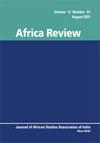美国退出《巴黎协定》:对非洲气候融资的影响
IF 0.5
Q4 AREA STUDIES
引用次数: 3
摘要
本文以复杂的相互依赖为理论方法,研究了美国退出《巴黎协定》可能对非洲气候融资造成的假设损害。2017年6月,唐纳德·特朗普总统公开宣布美国打算退出进一步参与多边的《巴黎协定》。对于美国气候政策的海外热心追随者和分析人士来说,这种单边行动从来都不奇怪。相反,这是对《京都议定书》经历的怀念,特别是类似的举动是如何过度延长了全球气候谈判,直到2015年底《巴黎协定》出台。尽管《巴黎协定》是第一个全国性的气候协议,值得注意,但它也留下了一些未解决的问题。其中值得注意的是气候融资,这一问题一直是发展中国家,特别是非洲发展中国家最具争议和最关键的问题。非洲对气候变化的影响较小,而且具有讽刺意味的是,非洲是受气候变化影响最严重的地区,与此相反,美国退出《巴黎协定》加剧了人们对气候融资的担忧,实际上,这预示着非洲大陆仍在努力应对气候变化的不利影响。本文章由计算机程序翻译,如有差异,请以英文原文为准。
U.S. withdrawal from the Paris Agreement: implications for climate finance in Africa
ABSTRACT Relying on complex interdependence as a theoretical approach, this paper investigates the hypothetical damage that the U.S. withdrawal from the Paris Agreement could represent for Africa in terms of climate finance. In June 2017, President Donald Trump publicly declared the U.S. intention to withdraw from further participating in the multilateral Paris Agreement. To keen followers and analysts of the U.S. climate policy beyond its borders, such unilateral action was never a surprise. Rather, it is nostalgic of the experience of the Kyoto Protocol, particularly how more or less similar move unduly prolonged the global climate negotiations up till late 2015 when the Paris Agreement came about. Although the Paris Agreement is remarkable as it represents the first states-wide climate deal, it however left a number of issues unresolved. Notable among which is climate finance which has remained the most contentious and of critical concern to developing countries, particularly in Africa. Pitted against the fact that Africa contributes less to climate change and, ironically, the hardest-hit by the phenomenon, the U.S. withdrawal from the Paris Agreement aggravates concerns around climate finance and, indeed, portends additional burdens for a continent that is still struggling to cope with the untoward fallout of climate change.
求助全文
通过发布文献求助,成功后即可免费获取论文全文。
去求助
来源期刊

Africa Review
AREA STUDIES-
CiteScore
1.80
自引率
12.50%
发文量
22
期刊介绍:
Africa Review is an interdisciplinary academic journal of the African Studies Association of India (ASA India) and focuses on theoretical, historical, literary and developmental enquiries related to African affairs. The central aim of the journal is to promote a scholarly understanding of developments and change in Africa, publishing both original scholarship on developments in individual countries as well as comparative analyses examining the wider region. The journal serves the full spectrum of social science disciplinary communities, including anthropology, archaeology, history, law, sociology, demography, development studies, economics, education, gender studies, industrial relations, literature, politics and urban studies.
 求助内容:
求助内容: 应助结果提醒方式:
应助结果提醒方式:


